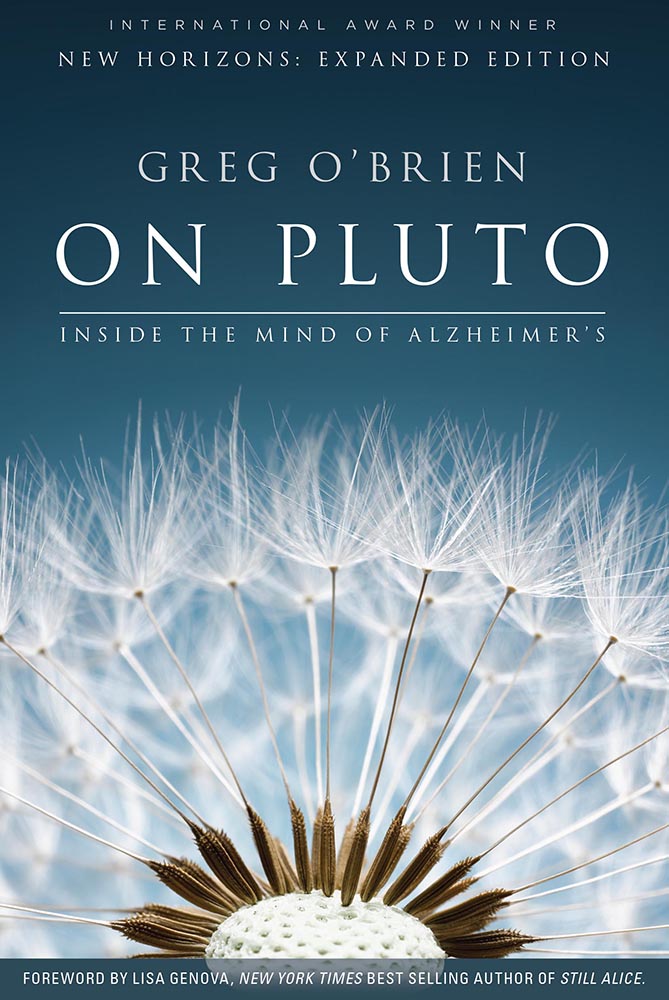Chapter 4
Heading Out To Pluto
My private darkness in allegorical terms is pluto, a reference from my early days as an investigative reporter when I went deep “off-the-record” with sources. “We’re heading out to Pluto,” I would say, “where no one can hear what is said.”
The Pluto metaphor still works for me, more than ever, as the urge to drift out in Alzheimer’s overcomes at intervals. As noted in the preface, Pluto, previously known as the ninth planet, about 3.1 billion miles from Earth, is relegated now to “dwarf planet” status, a sixth the mass of the moon and a third its volume, a “plutoid,” given it is one of the bodies within the Kuiper Belt, a dense cluster of rock and ice. All the more isolated today for off-the-record talks. It is a fine place to get lost metaphorically. Pluto’s orbit, like mine at times, is chaotic; its tiny size makes it sensitive to immeasurably small particles of the solar system, hard to predict factors that will gradually disrupt an orbit—the perfect place to have a conversation that “never existed” or a conversation one can’t recall. Over the years, I have often taken close family, colleagues, and clients “out to Pluto” to discuss unmentionables of life, revelations, and comments that need to stay in a place without oxygen. Many have been there and back with me, allegorically. I want them to be familiar with the planet. One day, like my mom, I won’t return from this dark, icy place, and I want my family and friends to know where I am.
Then, as I’ve learned from observing my grandfather and mother, it’s off even further beyond Pluto to Sedna for the final journey, the end staging of Alzheimer’s. Sedna, a far more desolate place, the so-called dwarf tenth planet orbiting the sun beyond Pluto, was discovered in 2003. It is the coldest, darkest, most distant known body in our solar system—84 billion miles from the light of the sun, with an exceptionally long and elongated orbit, taking approximately 11,400 years to complete. It’s a place where the temperature never rises above minus 240 degrees Celsius, minus 464 Fahrenheit.
That’s consummate isolation; the word picture helps me relate. Distant heavenly bodies are far less intimidating to me than the realities of the end stage of Alzheimer’s. Completion of the journey brings one to a far better, more peaceful place—Heaven, or however you want to define it. Family is waiting for me there, and there are days I can’t wait to join them.
In the meantime, I see a lot of smart doctors and counselors with a range of connections to top Boston area hospitals and an assortment of coping mechanisms. But I crave the simple touch—an earnest smile, a hug, a touch of the hand—far more than a medical prescription or a clinical trial. A simple touch increases body awareness and alterness for those with Alzheimer’s, and reduces feelings of confusion and anxiety. My general practitioner, Dr. Barry Conant, a close friend, an extraordinary man, and a better golfer than I, has offered the best advice to date. He has urged me, on numerous occasions, to stop assaulting Alzheimer’s head on.
“You can’t win in a head butt,” he has said with great insight.
“That doesn’t work.”
“You just have to learn to dance with it!”
****
Perhaps Robert Frost said it best: “In three words, I can sum up everything I’ve learned about life: It goes on.”
Life goes on. Even on Pluto. The unnerving reality of Alzheimer’s—the “he is me” part—resonates every day in fear, hope, humor, fundamental anger, challenge, and faith. No one wants to talk about Alzheimer’s, but Alzheimer’s doesn’t play favorites. Just ask the families of individuals like Ronald Reagan, Norman Rockwell, E. B. White, former British Prime Ministers Harold Wilson and Margaret Thatcher, Barry Goldwater, Charlton Heston, Rita Hayworth, Otto Preminger, Aaron Copland, Sugar Ray Robinson, Burgess Meredith, civil right defender Rosa Parks, Glen Campbell, Peter Falk, former University of Tennessee Women’s Basketball Head Coach Pat Summit, Barbara Smith (B. Smith) restaurateur, author, model, and television host, and the millions more afflicted with the disease or about to grapple with it—a spouse, family member, or close friend. A grim prognosis.
But laughter can be a powerful antidote to dementia—the pain, conflict, and stress of it. A good laugh, doctors say, reduces tension and can leave muscles relaxed for up to 45 minutes. Laughter boosts the immune system, decreases stress hormones, and triggers the release of endorphins—the natural drug of choice.
Siri, my droll personal assistant and the knowledge navigator for my indispensable iPhone 5, is getting into the act.
Ask Siri, “Tell me a joke about Alzheimer’s?”
“I can’t,” she often responds. “I forget the punch line.”
****
